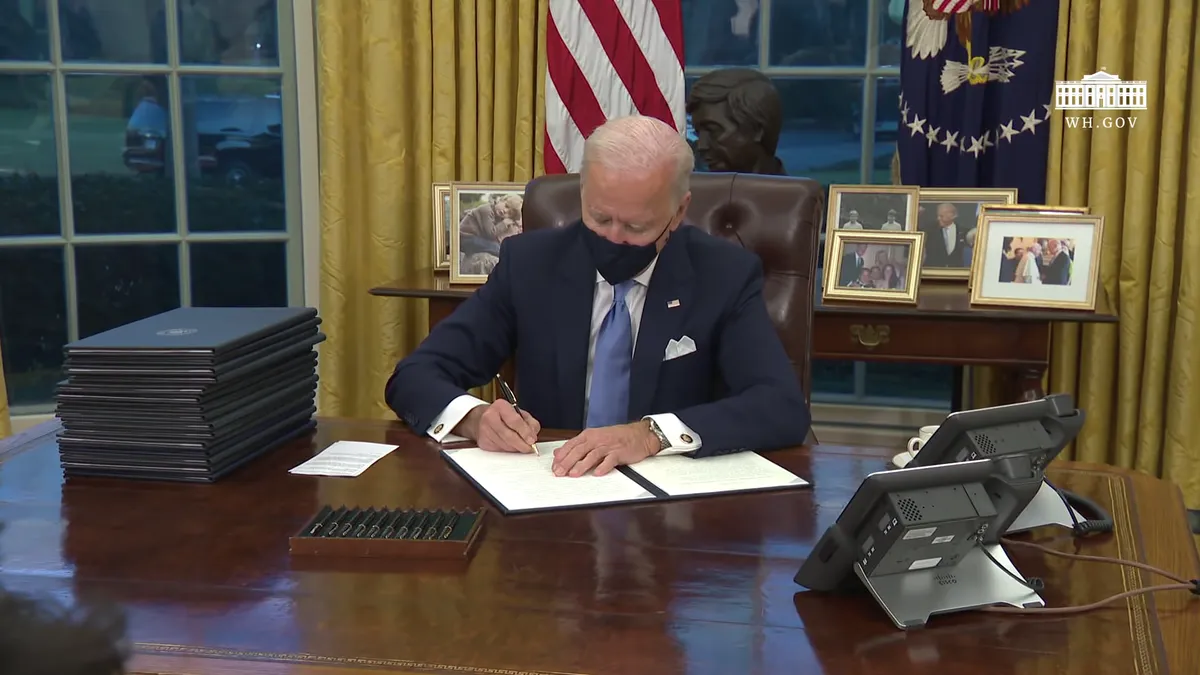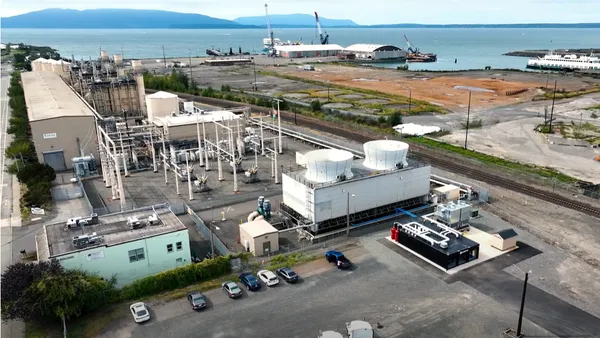Dive Brief:
-
President Joe Biden signed an executive order on Wednesday, ending federal subsidies for fossil fuels, aiming to double U.S. offshore wind capacity by 2030 and directing infrastructure planning to accelerate transmission and clean energy buildout.
-
"Tackling the Climate Crisis at Home and Abroad" was one of three executive orders the president signed, all aimed at placing the climate crisis at the center of his administration and moving the U.S. toward 100% clean electricity by 2035. It also calls for electrifying the federal vehicle fleet, reviewing mining and drilling activities on public lands, and directing federal investments toward creating new job opportunities for fossil fuel workers.
-
"Transforming the American electric sector to produce power without carbon pollution will be a tremendous spur to job creation and economic competitiveness in the 21st century, not to mention the benefits of our health and to our environment," Biden said before signing the orders.
Dive Insight:
Wednesday's executive orders are the latest sign the Biden administration will place a high priority on clean energy and the environment in the next four years.
Among other things, the climate crisis order promises to significantly build out offshore wind, an industry that has struggled to obtain permitting on the Atlantic coast, in part due to lack of funding for the Bureau of Ocean Energy Management (BOEM), which sits under the Department of Interior. Biden's executive order directs the Secretary of the Interior to review the siting and permitting processes in order to identify ways the U.S. can double its offshore wind output in the next decade, something very feasible, according to the renewables industry.
Further, the order directs the Council on Environmental Quality and the Office of Management and Budget to ensure federal infrastructure investments are sustainable and reduce emissions, including through accelerating transmission and clean energy. Transmission upgrades are widely considered essential to ensuring higher levels of renewable energy are able to connect to the grid, and upgrading the planning process will likely be a priority for FERC in the coming year.
"The Department of Interior has many tools it can deploy to double offshore wind generation by 2030, and the President's clarion call for greater transmission investment is an essential component of providing reliable and affordable renewable energy to every American," said Gregory Wetstone, president and CEO of the American Council on Renewable Energy, in a statement.
The order also calls for an end to fossil fuel subsidies, asking the Office of Management and Budget to eliminate subsidies for oil, gas and coal from the budget request for fiscal year 2022, and every year after.
There are a number of direct and indirect subsidies for fossil fuels, costing the federal government billions of dollars per year, according to the Environmental and Energy Study Institute. The subsidies mostly target oil and gas production, but some apply to coal and combined cycle plants as well. The 2005 Energy Policy Act, for example, authorized tax credits for integrated gasification combined cycle plants and other projects that would reduce coal emissions.
"Subsidizing fossil fuels in 2021 is not an optimal use of resources," said Daniel Bresette, executive director of the Environmental and Energy Study Institute. He added that while "there's a way to read the executive order and see 'Subsidies will stop,' ... this is just the beginning of that process."
"It's important we see this as leadership because the follow through is going to matter a lot here," he said.
Biden's orders also freeze new oil and gas leases on public lands, and review royalties for gas, oil and coal production. To mitigate the economic impacts, his orders also aim to direct attention and investment toward workers in communities that rely heavily on jobs in the fossil fuel industry, including through creating alternative jobs plugging oil wells and repurposing old power plant sites, and creating working groups to help with economic recovery and stimulus for those communities.
"We are creatively looking at those opportunities for investment so that we can get people understanding that we are not trying to take away jobs," said Gina McCarthy, national climate adviser for the White House. "When we say climate change, eventually people are going to think 'jobs.'"
The economic impact of the energy transition has been a central focus for lawmakers from states that focus on fossil fuels, and the new Senate has two coal state senators as chair and ranking member of the Energy and Natural Resources Committee. Chair Joe Manchin, D-W. Va., said in a statement he has a "strong commitment to advancing innovative energy technologies in order to address climate change while maintaining our energy independence," adding that he intends to hold the administration to its promise of reinvesting in communities that have lost jobs throughout the energy transition.
Ranking Member John Barrasso, R-Wyo., and other Republicans were more critical of the orders.
"Despite all the hot air from climate alarmists, banning new oil, gas, and coal leases on federal land and waters will do nothing to address climate change. Energy producers will simply go elsewhere — likely out of state or overseas," said Barrasso in a statement.
Biden's other two orders direct agencies to make decisions based on the "best available science and data" and re-establishes the President's Council of Advisors on Science and Technology. Ahead of the orders, Biden made comments Monday calling to transition the federal government's vehicle fleet to all American-made electric vehicles.
The orders also follow action he took at the beginning of his presidency to rejoin the Paris climate accord and review some of the regulatory actions made under former President Donald Trump.













